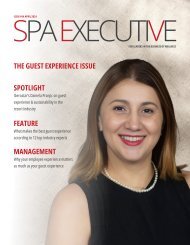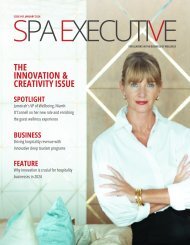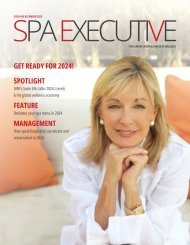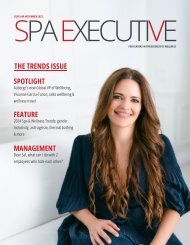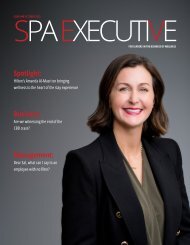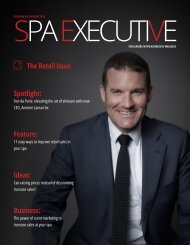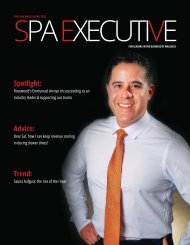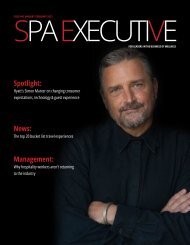Spa Executive - January 2021
Create successful ePaper yourself
Turn your PDF publications into a flip-book with our unique Google optimized e-Paper software.
<strong>Spa</strong> <strong>Executive</strong><br />
For leaders in the business of wellness<br />
ISSUE #23 – JANUARY <strong>2021</strong><br />
NIGEL FRANKLYN, “THE<br />
SPA WHISPERER,”<br />
On The Past, Present,<br />
And Future Of The<br />
Wellness Industry
<strong>Spa</strong> <strong>Executive</strong><br />
For leaders in the business of wellness<br />
ISSUE #23 – JANUARY <strong>2021</strong><br />
IN THIS MONTH'S ISSUE<br />
TRENDS PAGE 3<br />
9 SPA AND WELLNESS TRENDS<br />
FOR <strong>2021</strong>: A HOSPITALITY<br />
REPORT<br />
TECHNOLOGY PAGE 4<br />
CONTACTLESS EXPERIENCES<br />
WILL BE KEY TO HOSPITALITY<br />
SUCCESS IN <strong>2021</strong><br />
MANAGEMENT PAGE 6<br />
7 MANAGEMENT TIPS FOR A<br />
DRAMA-FREE WORKPLACE<br />
MANAGEMENT PAGE 8<br />
4 WAYS HOSPITALITY<br />
SOFTWARE CAN HELP YOU HIT<br />
THE GROUND RUNNING IN <strong>2021</strong><br />
SPOTLIGHT PAGE 12<br />
NIGEL FRANKLYN, “THE SPA<br />
WHISPERER,”<br />
On The Past, Present, And Future Of<br />
The Wellness Industry<br />
BUSINESS PAGE 16<br />
LINDSAY MADDEN-NADEAU<br />
ON MERAKI & AUTHENTIC<br />
WELLNESS EXPERIENCES<br />
BUSINESS PAGE 18<br />
WHY WELLNESS IS MORE<br />
IMPORTANT THAN EVER IN <strong>2021</strong><br />
BUSINESS PAGE 20<br />
ONE PERSPECTIVE ON THE<br />
FUTURE OF WELLNESS TOURISM<br />
GROWTH PAGE 10<br />
FEATURED PROPERTY:<br />
Four Seasons Hotel Bangkok at<br />
Chao Phraya River<br />
PUBLISHER<br />
CREATIVE DIRECTOR<br />
EDITOR<br />
DESIGNER<br />
Roger Sholanki<br />
Nima Chadha<br />
Elizabeth Bromstein<br />
Samuel Peter
TRENDS<br />
9 SPA AND WELLNESS TRENDS<br />
FOR <strong>2021</strong>: A HOSPITALITY REPORT<br />
It’s time to look into our crystal balls and predict the future for the year ahead. Here are the<br />
trends we’ll be watching in our special report: Nine spa and wellness trends for <strong>2021</strong>.<br />
2020 has been an unpredictable year, and<br />
as we look into <strong>2021</strong> we’re all hoping that<br />
whatever the year ahead has in store for us<br />
is better than what we have been living.<br />
The COVID-19 pandemic has wrought<br />
havoc on the hospitality and spa industries,<br />
but has also inspired innovative solutions<br />
and renewed consumer interest in health<br />
and wellness related topics and research.<br />
Looking forward, <strong>Spa</strong> <strong>Executive</strong> has<br />
created our annual list of <strong>Spa</strong> & Wellness<br />
trends we’ll be keeping our eyes on in <strong>2021</strong>.<br />
Much of this outlook is driven by recent<br />
developments. People have been spending<br />
a lot more time at home, and focus has<br />
shifted from some areas while heightened<br />
attention has been given to others. Mental<br />
health and sleep are top priorities, while<br />
anything that involves a group of people<br />
getting together in person is yesterday’s<br />
news. Meanwhile, developments with, and<br />
interest in, psychedelic substances continue<br />
unabated. Let’s start there, shall we?<br />
Nine spa and wellness<br />
trends for <strong>2021</strong>:<br />
1. Ayahuasca<br />
Last year we tagged psychedelic-assisted<br />
therapy as a trend to watch, and one<br />
of the stars to emerge out of this is<br />
ayahuasca, an entheogenic brew native<br />
to South America that has been used in<br />
sacred healing ceremonies for centuries.<br />
Until recently, the tea commonly made<br />
with the Banisteriopsis caapi vine and<br />
the Psychotria viridis shrub was virtually<br />
unheard of outside of certain circles. Today<br />
it’s being eyed as a potential treatment<br />
for mood disorders and neurological<br />
conditions like depression, addiction, and<br />
Parkinson’s and Alzheimer’s diseases.<br />
The main natural component drawing<br />
researcher attention is dimethyltryptamine<br />
(DMT). Recent research at Complutense<br />
University of Madrid found that DMT<br />
promotes neurogenesis – the formation of<br />
new neurons – and induces the formation<br />
of other neural cells. This means that the<br />
compound has the capacity to modulate<br />
brain plasticity and suggests therapeutic<br />
potential for a range of psychiatric and<br />
neurological disorders. Perhaps more<br />
interesting is the fact that the researchers<br />
found a way to negate the hallucinogenic<br />
effect by changing the type of receptor to<br />
which the DMT binds, increasing its potential<br />
for future administration to patients.<br />
Researchers in Seattle also have plans<br />
to test ayahuasca as a treatment for<br />
depression in a phase I randomized<br />
controlled trial that has not yet begun.<br />
Outside of a medical setting the global<br />
popularity of the hallucinogenic ritual is<br />
growing. The brew is illegal in many places<br />
but prior to the current pandemic, the<br />
New York Times reported that ayahuasca<br />
tourism to Central and South America was<br />
thriving, “with more and more people happy<br />
to fly thousands of miles to take part in<br />
weeklong ceremonies in Peruvian jungles,<br />
or to seek out more luxurious contexts,<br />
like a four-star resort that comes complete<br />
with masseuses, pools, and state of the art<br />
fitness centers.”<br />
2. Private & bespoke bookings<br />
Those with the means will be creating their<br />
own private travel and wellness experiences<br />
in which they’re not required to spend time<br />
in contact with other people. From guided<br />
tours and private cars, to private planes and<br />
boats and other forms of chartered travel,<br />
the wealthy wishing to travel will find ways<br />
to do so.<br />
Metamo, for example, a travel concept<br />
offering immersive trips and customized<br />
itineraries to destinations across East Africa,<br />
will upgrade all bookings for parties of four<br />
or more travelers to private journeys through<br />
<strong>2021</strong>. According to a media release, “This<br />
provides travelers the experience of a<br />
life-changing exploration with the peace of<br />
mind they are with a private small group of<br />
people they know and love.” And, according<br />
to Barron’s, Micato, another company that<br />
offers luxury African safaris, reported that<br />
bookings for private charter flights (rather<br />
than scheduled flights) on safari trips are up<br />
more than 25% over 2019, increasing from<br />
42% to 68%…<br />
Click here to read the rest of this<br />
article and learn more.<br />
- 3 - <strong>Spa</strong> <strong>Executive</strong> | JANUARY <strong>2021</strong> ISSUE
TECHNOLOGY<br />
CONTACTLESS EXPERIENCES<br />
WILL BE KEY TO HOSPITALITY<br />
SUCCESS IN <strong>2021</strong><br />
People are anxious to get travelling as soon as they can. Contactless<br />
experiences will help give them the confidence to do so.<br />
As we charge enthusiastically into<br />
<strong>2021</strong>, global travelers are eager to<br />
get globetrotting when coronavirus<br />
pandemic-related restrictions are lifted.<br />
And one thing that will help them to feel<br />
more confident in doing so is technology.<br />
Leaders and decision makers would do<br />
well to embrace the technology options<br />
available to them in order to aid recovery<br />
of the travel sector.<br />
Recent surveys by various parties sought<br />
to gain insight into how the travel and<br />
hospitality industries can recover from the<br />
challenges faced in 2020. Key findings<br />
include that 95% of Americans are missing<br />
travel and that they are eager to embrace<br />
contactless and mobile experiences.<br />
Americans are excited to<br />
get travelling<br />
In response to a survey by Hilton nine<br />
in 10 US respondents said that travel<br />
memories are among their fondest,<br />
winning out over special occasions and<br />
personal achievements. And travel is<br />
<strong>Spa</strong> <strong>Executive</strong> | JANUARY <strong>2021</strong> ISSUE - 4 -
credited with creating people’s most<br />
frequently recalled happy memories with<br />
the majority of respondents also stating<br />
that creating these memories is a primary<br />
motivation for taking trips.<br />
More than half said travel memories are<br />
more important than their favorite piece<br />
of jewelry (54%), and their smartphone<br />
(53%). That’s some serious love of travel.<br />
And, since so many people have been<br />
grounded for extended periods of time,<br />
it’s no surprise that we’re eager to take<br />
off. A massive 94% of respondents who<br />
travel plan to do so once pandemicrelated<br />
restrictions and limitations are<br />
lifted. Two thirds plan to make travel a<br />
priority and to take the bucket list trip of<br />
their dreams. Almost all (91%) travelers<br />
agree that hotels help to make a trip<br />
memorable, most notably when guests<br />
can wake up next to a view.<br />
Contactless experiences<br />
will play an important<br />
role<br />
While this is all very exciting for both<br />
the hospitality sector and travelers<br />
themselves, there remain concerns on<br />
both sides about safety, comfort levels,<br />
and more. Contactless and touchless<br />
experiences will be key. A survey of more<br />
than 2,000 travelers found that the desire<br />
for contactless experiences is high. Sixtytwo<br />
percent of respondents said they<br />
would prefer to check in and out through<br />
a hotel app, 30% would prefer to check<br />
in and out online, and only eight percent<br />
would prefer to check in and out at a<br />
public kiosk. Hospitality companies will<br />
need to offer these options.<br />
How technology can<br />
ease fears and create a<br />
safer environment<br />
A report from travel technology company<br />
Amadeus confirms that technology will<br />
play a crucial role in supporting recovery<br />
of the industry. Travel and tourism jobs<br />
in areas like hospitality, airlines, cruises,<br />
travel agencies, car rentals, events,<br />
and attractions accounted for one in 10<br />
jobs in the world pre-COVID. Amadeus<br />
commissioned the research to learn how<br />
the industry and governments can work to<br />
rebuild traveler confidence and stimulate<br />
recovery of the sector. A survey of more<br />
than 6,000 travelers across France,<br />
Germany, India, Singapore, UK, and the<br />
US, was designed to unearth traveler’s<br />
top concerns and learn how technology<br />
can help ease them.<br />
Highlights of the findings include:<br />
• 84% of travelers said technology<br />
would increase their confidence to<br />
travel in the next year by addressing<br />
concerns around crowds, social<br />
distancing and physical touchpoints.<br />
• 42% of respondents say contactless<br />
and mobile payment options are key<br />
to reducing physical contact.<br />
• 42% say mobile applications that<br />
provide notifications about localized<br />
COVID-19 outbreaks and changes to<br />
government guidelines would make<br />
them feel better about travelling.<br />
• 34% of travelers who have concerns<br />
about travelling say biometrics like<br />
facial or voice recognition that enable<br />
check-in, pass-through security,<br />
and boarding without the need for<br />
physical checks would make them<br />
more likely to travel.<br />
The top five things travelers want out of<br />
travel-related technology are:<br />
• Reduced lines and congestion in<br />
public spaces (38%)<br />
• Minimizing of face-to-face or physical<br />
contact with others (31%)<br />
• Protection of financial data and<br />
personal information (31%)<br />
• Advance notice of delays (29%)<br />
• Accurate and effective national test,<br />
track, and trace programs (28%)<br />
For stakeholders, the survey results show<br />
that the top five ways to build traveler<br />
confidence include:<br />
• Providing access to flexible change,<br />
cancellations policies, and payment<br />
terms (39%)<br />
• Limiting the number of passengers<br />
on a plane (38%)<br />
• Making it possible for travelers<br />
to socially or physically distance<br />
throughout the journey (36%)<br />
• Having visibility to and assurance<br />
of sanitization, hygiene, and<br />
safety measures in hotels and<br />
accommodations (36%)<br />
• Having effective test, track and trace<br />
programs in place (34%)<br />
“This research provides a source of<br />
optimism for the industry as many of the<br />
travelers’ concerns can be addressed<br />
by technology available now, at every<br />
stage of a traveler’s experience. Whether<br />
it is new mobile applications, biometrics<br />
or contactless solutions, we need to<br />
explore together as an industry and with<br />
governments how best to accelerate<br />
adoption if we are to encourage global<br />
travel, which is a major driver of global<br />
prosperity,” Christophe Bousquet, Chief<br />
Technology Officer, Amadeus, is quoted<br />
as saying.<br />
- 5 - <strong>Spa</strong> <strong>Executive</strong> | JANUARY <strong>2021</strong> ISSUE
MANAGEMENT<br />
7 MANAGEMENT TIPS FOR A<br />
DRAMA-FREE WORKPLACE<br />
Drama takes an emotional toll and has a big monetary cost.<br />
Follow these management tips for a drama-free workplace.<br />
Lots of workplaces have drama and<br />
conflict, including spa, wellness, and<br />
hospitality businesses. Drama can stem<br />
from all sorts of roots, which include lack<br />
of communication and not feeling heard,<br />
and in spa, wellness, and hospitality,<br />
difficult or demanding guests can add to<br />
feelings of frustration and anger. Stressful<br />
times don’t help, nor do managers<br />
who aren’t paying attention and being<br />
appropriately supportive.<br />
You may wind up dealing with infighting,<br />
backstabbing, resentment, seething<br />
anger and more – all of which is very bad<br />
for your business. It affects the working<br />
environment and the atmosphere your<br />
guests experience when they come to<br />
your spa, resort, or hotel. And it costs<br />
you in revenue. One Gallup report found<br />
that U.S. employees spend 2.8 hours<br />
per week dealing with conflict, equating<br />
to approximately $359 billion in paid<br />
hours per year. But it’s not just about<br />
time spent on conflict – it’s about your<br />
guest experience and your employee<br />
experience. Toxic atmospheres don’t<br />
make successful business.<br />
Fortunately, if you’re a manager with<br />
drama in the spa or wellness workplace,<br />
there’s a lot you can do about it. Here are<br />
7 tips for a drama-free workplace.<br />
1. Model behavior<br />
A drama-free workplace starts with<br />
you. Do an honest assessment of<br />
your own behavior and ask yourself<br />
if you are contributing to the drama.<br />
Are you participating in gossip, playing<br />
favourites, taking things personally,<br />
making assumptions, or allowing your<br />
own moods to affect your interactions<br />
with your team? If you are doing any<br />
of these things (or anything else that’s<br />
contributing to the drama), you need to<br />
stop. Check your ego. It’s hard and we’re<br />
all human, but that is what is required of<br />
effective leaders.<br />
<strong>Spa</strong> <strong>Executive</strong> | JANUARY <strong>2021</strong> ISSUE - 6 -
2. Communicate expectations<br />
At no point should your team not know<br />
what is expected of them. They should<br />
know how they’re expected to behave,<br />
what success looks like, and how they’re<br />
expected to achieve it. Have a written code<br />
of conduct. According to ethics.org, a<br />
code of conduct “clarifies an organization’s<br />
mission, values and principles, linking<br />
them with standards of professional<br />
conduct. The code articulates the values<br />
the organization wishes to foster in leaders<br />
and employees and, in doing so, defines<br />
desired behavior.”<br />
Workplaces should have a zero-tolerance<br />
policy on gossip. That means allowing<br />
no trash talking, taking pleasure in the<br />
misfortune of others, rumor spreading,<br />
or conversation that has the potential to<br />
instigate conflict or cause pain. Hold a<br />
meeting to communicate this policy, write<br />
it up, abide by it yourself, and enforce it.<br />
3. Become an impartial<br />
mediator<br />
You may like some team members better<br />
than others. Nobody truly likes everyone<br />
equally. But that doesn’t mean you don’t<br />
have to treat everyone equally. If there is<br />
conflict, learn to handle it as an impartial<br />
mediator, which may mean learning to<br />
mediate. Effective mediation is a<br />
valuable skill for a manager, and you<br />
can learn it through online courses and<br />
books. Once you know how, use those<br />
skills whenever they are needed. Don’t<br />
let bad feelings percolate.<br />
4. Be there for your team<br />
Customer-facing wellness and hospitality<br />
employees may have to deal directly<br />
with demanding, entitled, and difficult<br />
customers. <strong>Spa</strong> therapists work in close<br />
quarters with strangers and are expected<br />
to not only handle difficult guests, but to<br />
heal and comfort them. It’s a lot to deal<br />
with and they shouldn’t be expected to<br />
do it alone. Have an open-door policy and<br />
conduct regular check-ins. Ask the right<br />
questions. People might not come to you<br />
with issues unless prompted to do so.<br />
Have your team members’ backs. Don’t<br />
immediately take that customer’s side<br />
in a conflict situation because you don’t<br />
want to lose their business, and certainly<br />
don’t do so in front of others. Your team<br />
member may never forgive you. Again,<br />
effective mediation is key and should<br />
take place behind closed doors, after<br />
gathering all the important information<br />
and allowing for a cool-down period. Even<br />
if the outcome is in favour of the guest,<br />
your employee should still feel supported<br />
and heard.<br />
5. Clean up the toxic element<br />
Drama is often created by a single<br />
instigator. If there is a person, or people,<br />
with a toxic attitude causing trouble,<br />
this must be addressed. Speak to the<br />
employee and ask if there is an issue<br />
they need to discuss. Make it clear you’re<br />
ready to listen and the door is open.<br />
In a Harvard Business Review article,<br />
Christine Porath, author of Mastering<br />
Civility: A Manifesto for the Workplace,<br />
points out that many people have no idea<br />
how destructive their behavior is. Give<br />
concrete, specific feedback and offer the<br />
opportunity to change.<br />
6. Shhhhhh….listen<br />
Listen when someone is speaking<br />
and to your employees. Also listen to<br />
your environment. Listen to the ways<br />
people interact with each other and for<br />
rumblings of dissatisfaction, unhappiness,<br />
and resentment. Listen to the world<br />
around you, and if you hear something<br />
worrisome, speak to it.<br />
7. Channel competitive energy<br />
into purpose and organizational<br />
success<br />
Encourage people to work together, not<br />
against each other, and communicate<br />
that everyone’s success contributes to<br />
the success of the business. Also remind<br />
employees that their work has purpose.<br />
Eric Stephenson, Chief Wellness Officer of<br />
Elements Massage, once told us, “The spa<br />
industry is so purpose driven, I think a key<br />
piece of engagement is regularly reminding<br />
our teams what we’re doing in the world,<br />
above and beyond making money.”<br />
Recognize and reward B players as<br />
much as you recognize and reward A<br />
players. 60%-70% of your team is made<br />
up of B players, and they shouldn’t<br />
be an afterthought. If you only reward<br />
top people over and over again, you’re<br />
devaluing the people who comprise a<br />
huge part of your success. B players<br />
might never become A players and that’s<br />
OK. Show them the love they deserve.<br />
Drama and conflict are not inevitable. We<br />
can have comfortable, calm, happy and<br />
thriving workplaces. It just takes intention<br />
and effort.<br />
- 7 - <strong>Spa</strong> <strong>Executive</strong> | JANUARY <strong>2021</strong> ISSUE
TECHNOLOGY<br />
4 WAYS HOSPITALITY SOFTWARE<br />
CAN HELP YOU HIT THE GROUND<br />
RUNNING IN <strong>2021</strong><br />
Hit the ground running in <strong>2021</strong> with hospitality software to<br />
support your business operations, improve guest experience,<br />
drive revenue, and set you on a path to success.<br />
New year, new possibilities. The beginning<br />
of a new year is always exciting, but <strong>2021</strong><br />
has an especially jubilant feeling to it. Last<br />
year was a struggle for the spa, wellness<br />
and hospitality sectors, and we’re all<br />
ready to leave it behind. While we realize<br />
that the COVID-19 pandemic is not over,<br />
we have had time to rethink, reimagine,<br />
and restructure. We’ve come up with<br />
innovative and creative ideas for keeping<br />
our businesses alive and our customers<br />
happy, many with the luxury experiences<br />
to which they’ve become accustomed.<br />
And now we want to hit the ground running.<br />
Whether you’re an enterprise company<br />
with several resorts or hotels, a boutique<br />
operation, or an independent, you could<br />
probably use some help. Software can<br />
provide the help you need. The right spa<br />
management software will deliver what<br />
you need to improve guest experience,<br />
drive revenue, and set you and your<br />
business on a clear path to success.<br />
Here are 4 ways hospitality software can<br />
help you hit the ground running in <strong>2021</strong>.<br />
Save time on intelligence<br />
and reporting<br />
Deep insight into your operations,<br />
finances, and KPIs is an imperative part<br />
of making smart decisions, and making<br />
<strong>Spa</strong> <strong>Executive</strong> | JANUARY <strong>2021</strong> ISSUE - 8 -
smart decisions is very important right<br />
now (and always). But tracking all this<br />
yourself takes time, leaves a lot of room<br />
for errors, and is generally tedious.<br />
Software can save the day.<br />
A real-time intelligence dashboard makes<br />
it easy to centrally report on operational<br />
efficiency and sales performance, even<br />
across multiple locations. Software can<br />
help you easily analyze customer buying<br />
trends, preferences, retail purchases,<br />
and demographics, and appointment<br />
booking software integrates with realtime<br />
sales reporting to provide insight<br />
into location performance (if you have<br />
multiple locations), top sellers, technician<br />
productivity, and utilization. Software<br />
can automatically calculate employee<br />
payroll based on commissions earned,<br />
clock time, and track attendance. And<br />
revenue forecasting can even predict<br />
revenues from advance bookings, referral<br />
sources, gift card and membership sales,<br />
and marketing initiatives – an invaluable<br />
capability when all of this is so seemingly<br />
uncertain. When reporting is easy, time is<br />
freed up to focus on things that won’t take<br />
care of themselves<br />
Clean up your inventory<br />
& ramp up retail<br />
As the industry recovers, retail sales are<br />
going to play a big role. Retail can do a lot<br />
to shore up revenue you may be missing<br />
from lower occupancy in your spa, but<br />
for that to work, you need great inventory<br />
management. Can you afford to run out of<br />
popular products right now or to order too<br />
much of something that isn’t going to sell?<br />
Probably not.<br />
<strong>Spa</strong> software allows you to manage<br />
inventory for all of your locations in one<br />
secure spot. Track purchase order<br />
progress, automatically update on-hand<br />
counts, easily record products received,<br />
track inter-company transfers, and<br />
view balances for all of your locations<br />
in one central place. Software can also<br />
maintain vendor records, and improve<br />
staff productivity by preparing reusable<br />
purchase order templates, allowing you<br />
to automatically restock retail products.<br />
All you have to do is communicate to<br />
your customers that they will love your<br />
products as much as you do.<br />
Create lasting<br />
relationships<br />
You need to build lasting relationships<br />
and turn new customers into returning<br />
ones. This will be the difference between<br />
success and failure in <strong>2021</strong>. According to<br />
Outbound Engine:<br />
• Acquiring a new customer can cost<br />
5X more than retaining an existing one<br />
• Increasing customer retention by 5%<br />
can increase profits from 25-95%<br />
• The success rate of selling to an<br />
existing customer is 60-70%,<br />
compared with a 5-20% success rate<br />
of selling to a new one.<br />
Creating the ultimate guest experience<br />
will help build those connections. Loyalty<br />
and membership programs keep people<br />
coming back and referral incentives<br />
drive them to tell their friends. Your<br />
spa management software system can<br />
centrally track and allow guests to redeem<br />
loyalty points, or apply them at checkout,<br />
while automatic updates to customer<br />
accounts keeps guests informed about<br />
their points in real time. Software can<br />
also help you manage guest profiles,<br />
purchases, and customer activity, and<br />
provide automatic alerts that help staff<br />
remember important guest information.<br />
Central guest profiling and therapist<br />
notes provide quick access to insights<br />
gathered through various points of<br />
contact, including purchase history and<br />
preferences across locations, making it<br />
easy to personalize guest experience and<br />
improve retention.<br />
Integrate your retail sales into your<br />
guest experience, loyalty programs,<br />
memberships, and promotions to<br />
increase revenue and create a holistic<br />
business model.<br />
Meet your guests’<br />
changing needs<br />
Your customer’s needs have changed.<br />
They don’t have the same comfort levels<br />
they once did or the same desire for<br />
human interaction. But they do want<br />
wellness and support, and to feel that<br />
they are caring for themselves and<br />
being cared for. There are many ways<br />
software can support this. Online and<br />
mobile booking, contactless payments,<br />
and touchless experiences like mobile<br />
check in and check out are clearly the<br />
top functionalities here. And let’s not<br />
forget your intake forms, which should be<br />
filled out virtually to avoid having people<br />
hanging around in a waiting room and<br />
sharing touchpoints. Software also helps<br />
you communicate safety protocols to your<br />
guests and gather feedback through NPS<br />
surveys. Now, more than ever, you have<br />
to gather feedback and show you care<br />
what your guests think. Few things will be<br />
more important than listening and being<br />
receptive to customers’ needs.<br />
We’re optimistic about <strong>2021</strong> and we<br />
can’t hide it. The wellness and hospitality<br />
industries have a lot of work ahead and<br />
you can’t do it alone. Nor should you.<br />
- 9 - <strong>Spa</strong> <strong>Executive</strong> | JANUARY <strong>2021</strong> ISSUE
GROWTH<br />
FEATURED PROPERTY:<br />
FOUR SEASONS HOTEL<br />
BANGKOK AT CHAO PHRAYA<br />
RIVER<br />
Located on the river banks is an all-new sanctuary of residences and a<br />
hotel. Check out the Four Seasons Hotel Bangkok at Chao Phraya River.<br />
<strong>Spa</strong> <strong>Executive</strong> | JANUARY <strong>2021</strong> ISSUE - 10 -
Thailand’s Four Seasons Hotel<br />
Bangkok at Chao Phraya River is<br />
an all-new sanctuary located in the<br />
heart of Bangkok’s Creative District,<br />
just 40 minutes from Suvarnabhumi<br />
International Airport, along the historic<br />
Charoenkrung Road.<br />
The site is a complex of buildings on<br />
200 metres of open riverfront that<br />
includes a 299-room hotel and 366 Four<br />
Seasons Private Residences. These are<br />
connected by a series of indoor and<br />
outdoor spaces, eateries, and quiet<br />
courtyards, surrounded by lush, tropical<br />
greenery and the gentle sounds of water<br />
features. The complex also houses event<br />
spaces, an urban wellness centre, and a<br />
dedicated art space in partnership with<br />
MOCA Bangkok, running from the lobby<br />
to the river, showcasing contemporary<br />
Thai artists in changing exhibitions.<br />
Modern rooms and suites feature high<br />
ceilings, and floor-to-ceiling windows<br />
with garden or river views.<br />
“The much-anticipated return of Four<br />
Seasons to Thailand’s capital is nothing<br />
short of spectacular,” says Christian<br />
Clerc, Four Seasons President, Global<br />
Operations, in a statement. “Guests will<br />
be in awe of the exquisite design, the<br />
world-class restaurant and bar options,<br />
and a state-of-the-art wellness centre. As<br />
always, the unparalleled, intuitive service<br />
from Four Seasons people will be at the<br />
centre of it all.”<br />
service in a truly spectacular setting.”<br />
The Urban Wellness<br />
Centre at the Four<br />
Seasons Hotel Bangkok<br />
at Chao Phraya River<br />
The Urban Wellness Centre at Four<br />
Seasons Hotel Bangkok is like no other.<br />
Spread over more than 2,500 square<br />
metres, the Centre is conceived along<br />
three streams of wellness, two floors of<br />
innovation and one holistic haven.<br />
“Every aspect of the spa places<br />
equal emphasis on the ideas of Mind<br />
(spirituality), Body (spa), and Work<br />
(fitness),” Senior Director of <strong>Spa</strong>, Sandie<br />
Johannessen, said. “With the Palm<br />
Courtyard at its centre, it’s a true oasis<br />
of wellbeing in the heart of one of the<br />
world’s busiest cities, where each guest<br />
will find peace, relaxation, renewal and<br />
even a bit of indulgence with the skilled<br />
guidance of our caring therapists and<br />
wellness experts.”<br />
Featuring eight treatment rooms and a<br />
luxurious spa suite with its own private<br />
bath and indoor garden, the spa also<br />
includes a large consultation area with<br />
relaxation lounges and a retail store. A<br />
state-of-the-art gym, a dedicated mind<br />
and body studio with regular open and<br />
private classes, and a 30 metre lap<br />
pool make up the fitness area. Hair<br />
and nail salons and a barber shop offer<br />
additional services.<br />
Science meets natural<br />
wellness<br />
Treatments include a wide variety of<br />
massages that draw from Thai and<br />
Western traditions, wraps and scrubs to<br />
soften, hydrate and invigorate, and facials<br />
in collaboration with Hungarian premium<br />
skincare brand Omorovicza.<br />
The Transcendent Bamboo Massage,<br />
for example, employs a combination of<br />
deep-tissue work, long flowing strokes,<br />
and therapeutic bamboo sticks to create<br />
a powerful massage to release tension,<br />
soothe the senses, and promote deep<br />
relaxation. And the BellaBaci Cupping<br />
Massage is a tailor-made experience<br />
focused on evening skin tones and<br />
reducing cellulite, wrinkles and dimples to<br />
give skin a healthy glow.<br />
More features include an Advanced<br />
Beauty Room, where science meets<br />
natural wellness to offer a range of<br />
technologically advanced slimming and<br />
anti-ageing treatments for men and<br />
women. And a Bath Butler will concoct<br />
and pour the perfect, tailored bath, in<br />
which guests are invited to choose from<br />
a menu of ingredients designed to create<br />
a soothing, relaxing and therapeutic soak.<br />
General Manager Lubosh Barta, said:<br />
“Like the city of Bangkok, our new Four<br />
Seasons is full of surprises, whether it’s<br />
the breath-taking river views, the rich<br />
design details, the perfect cocktail or a<br />
striking piece of art. We look forward to<br />
offering personalized experiences in an<br />
environment of safety and trust as we<br />
embrace Four Seasons enhanced global<br />
health and safety program, Lead With<br />
Care, with uncompromising Four Seasons<br />
- 11 - <strong>Spa</strong> <strong>Executive</strong> | JANUARY <strong>2021</strong> ISSUE
SPOTLIGHT<br />
NIGEL FRANKLYN, “THE SPA<br />
WHISPERER,” ON THE PAST,<br />
PRESENT, AND FUTURE OF THE<br />
WELLNESS INDUSTRY<br />
Nigel Franklyn, The <strong>Spa</strong> Whisperer, has worked with some of the most iconic<br />
brands around the world as he helped shape the global luxury wellness industry.<br />
He talked with us about the past, present, and future of spa and wellness.<br />
<strong>Spa</strong> <strong>Executive</strong> | JANUARY <strong>2021</strong> ISSUE - 12 -
Nigel Franklyn, The <strong>Spa</strong> Whisperer,<br />
has spent his career helping lead the<br />
wellness evolution and shape luxury spa<br />
and wellness into the global force that it<br />
is today. A veteran of the global luxury<br />
wellness industry, Mr. Franklyn has worked<br />
with some of the most iconic brands<br />
around the world, including Four Seasons,<br />
George V, Paris, The Siam, Bangkok,<br />
Aman Resorts, and Clinique La Prairie.<br />
Hailed as a unique visionary and wellness<br />
influencer, Mr. Franklyn is a warm and<br />
charismatic personality, so it’s no surprise<br />
that he was named Global Wellness<br />
Personality in this year’s inaugural Hall of<br />
Wellness Awards by <strong>Spa</strong> Connectors.<br />
We spoke to him about the past, present,<br />
and future of the spa and wellness<br />
industry, what to look for in a spa<br />
therapist, and what he’s excited about.<br />
Tell us about your career<br />
trajectory and how you<br />
came to be doing what<br />
you are today?<br />
I went to university in the UK for English<br />
and journalism, then went to San<br />
Francisco and worked as a journalist.<br />
It was a different time, before the spa<br />
industry was even a thing. I went to write<br />
about the opening of a spa in Atlanta,<br />
and while I was there, I had this incredible<br />
experience with a therapist named<br />
Margaret. I remember everything about it.<br />
I remember what she wore, her hair, the<br />
tone of her voice… I don’t remember the<br />
treatment itself, but I do remember that<br />
she made me feel safe and wanted. I was<br />
so overwhelmed by that experience that<br />
I became a therapist, because I wanted<br />
to give that to people. It changed my life,<br />
and it changed who I was in my life.<br />
I became a massage therapist and an<br />
aesthetician, and then a consultant<br />
because I realized that I was one<br />
person and I needed an army of<br />
therapists around the world ready<br />
to make this big romantic difference<br />
in the lives of everybody. Working<br />
inside spas, developing therapies and<br />
therapists, naturally progressed into<br />
spa development, wellness concept<br />
development, and design. I work primarily<br />
now with architects and designers and<br />
we build entire wellness concepts. But<br />
the core of it always for me is the art of<br />
therapy, creating spaces where people<br />
can feel safe and wanted. That’s my<br />
romantic anchor.<br />
How has your experience<br />
in the industry changed<br />
since then?<br />
I was fortunate to have been at the<br />
forefront of this wellness evolution. I don’t<br />
have to convince people or make excuses<br />
anymore. Wellness is now a $4.2 or $4.3<br />
trillion industry. It’s three times the size<br />
of the pharmaceutical industry. The way<br />
I’m able to do my job has changed so<br />
much; I have access to everything now,<br />
which I never had before. When we first<br />
got into developing spas, I was always<br />
trying to find space in the laundry rooms<br />
in the basements of hotels because<br />
nobody believed that spa and wellness<br />
was a thing. Now people are asking me<br />
to create these transformative, integrative<br />
wellness experiences, because everyone<br />
has a greater understanding, especially<br />
now after this crappy year, of the impact<br />
wellness can have on their lives.<br />
What should spa<br />
directors look for in a<br />
therapist?<br />
Someone who really understands how<br />
to deliver wellness. If someone has<br />
spark and energy, and the emotional<br />
intelligence that creates a human<br />
connection, you can teach them anything<br />
else they need to learn. Wellness is such<br />
a beautiful, amorphous, transformative<br />
thing. Your hands don’t make you a<br />
therapist. Understanding steps one<br />
through six of a massage isn’t as<br />
important to me as understanding<br />
therapy as a transformative concept.<br />
Look at me. I was a journalist, and now I<br />
do this because of Margaret, who I’ll never<br />
meet again. I do breathing exercises on<br />
planes because, 15 years ago, a therapist<br />
in Dubai told me to. I still carry these<br />
pieces of information. It’s important to me<br />
that therapists understand that they have<br />
the power to change somebody’s life.<br />
How has the last year<br />
impacted the industry?<br />
In the beginning we were all just<br />
responding and worried about immediate<br />
necessities, like PPE. Now we are evolving<br />
and getting more creative. We’re talking<br />
about how technology can influence the<br />
wellness journey or spa experience, like<br />
contactless check in, air filtration systems,<br />
and UV sanitization. Out of crisis comes<br />
opportunity, right? The wellness industry<br />
is on the precipice, about to jump into<br />
something, a greater expansion, a greater<br />
universe than it was before.<br />
Wellness has become more accessible<br />
to everybody and people are more<br />
conscious of it, especially of their<br />
- 13 - <strong>Spa</strong> <strong>Executive</strong> | JANUARY <strong>2021</strong> ISSUE
SPOTLIGHT<br />
self-care. We’ve all been locked away<br />
and that isolation, that grief, is what the<br />
wellness industry can respond to and<br />
is responding to. I think this is a very<br />
exciting thing.<br />
Are there any trends or<br />
developments you’re<br />
excited about?<br />
I don’t like trends. I like shifts. Trends to<br />
me are like bamboo massage, while a<br />
shift is a change of thinking or focus and<br />
something to which we can sustainably<br />
respond. As somebody who’s responsible<br />
for creating sustainable wellness<br />
experiences, it’s important that I focus<br />
on what I think has some weight to it. I<br />
think mental wellness is going to be a big<br />
shift, and now that we’ve all gone through<br />
a collective mental health experience,<br />
the grief and stress, we can talk about it,<br />
whereas we couldn’t before.<br />
Back to technology, I also like that the<br />
Global Wellness Summit has been<br />
opened up to virtual attendees, because<br />
people aren’t travelling, which makes it<br />
open to everybody. Anybody can join<br />
these wonderful, informative initiatives<br />
like the GWS. So, just seeing how<br />
technology influences wellness, I think is<br />
super exciting.<br />
What are you working<br />
on that you’re excited<br />
about?<br />
I just teamed with some friends to launch<br />
our own sustainable therapeutic line of<br />
body products called Moss of the Isles.<br />
We use small batch hand harvested<br />
ingredients from Ireland and the British<br />
Isles. It was something I’ve always wanted<br />
to do. We have also created Moss<br />
Wellness Consultancy, a collaborative<br />
initiative that grew out of our deep-rooted<br />
passion for authentic, conscious wellness.<br />
And I have a big project in India called<br />
King’s Mansion. It’s a small, luxury<br />
wellness resort and the concept mixes<br />
Ayurvedic medicine and philosophies<br />
with state-of-the-art genomics and<br />
treatments like laser light infusions.<br />
My passion is combining traditional<br />
philosophies like TCM and Ayurvedic<br />
medicine with state-of-the-art, evidencebased<br />
science. I think moving forward,<br />
there will be a shift toward what I call<br />
wellness alchemy where we combine<br />
one philosophy with another.<br />
<strong>Spa</strong> <strong>Executive</strong> | JANUARY <strong>2021</strong> ISSUE - 14 -
BOOK ONLINE,<br />
PAY ONLINE,<br />
SKIP THE LINE<br />
Enjoy the contactless experience<br />
with Book4Time.<br />
- 15 - <strong>Spa</strong> <strong>Executive</strong> | JANUARY <strong>2021</strong> ISSUE
BUSINESS<br />
LINDSAY MADDEN-NADEAU<br />
ON MERAKI & AUTHENTIC<br />
WELLNESS EXPERIENCES<br />
Wellness industry leader, Lindsay Madden-Nadeau talks about Meraki, her new company<br />
creating bespoke wellness solutions, and what makes an authentic wellness experience.<br />
Lindsay Madden-Nadeau has spent<br />
the past 20 years travelling the globe<br />
working for some of the biggest names<br />
in hospitality and wellness. She was<br />
most recently the Global Director of<br />
Wellbeing for the luxury division of Accor,<br />
overseeing global wellbeing strategy for<br />
Raffles, Fairmont and Orient Express.<br />
She has been a judge for the World<br />
<strong>Spa</strong> & Wellness Awards, a contributor<br />
to several industry publications, and<br />
a public speaker at events around the<br />
world, including the Global Wellness<br />
Summit, World <strong>Spa</strong> & Wellness,<br />
Professional Beauty, and Fit Summit.<br />
She recently left the hotel world and<br />
founded Meraki, a bespoke wellness<br />
consultancy with a mission to create<br />
conscious, collaborative projects that<br />
continue to put wellness on the map.<br />
Madden-Nadeau makes it her mission<br />
to ensure each project has a strong<br />
differentiation and strategy at its heart.<br />
After spending 13 years in Dubai,<br />
Madden-Nadeau recently moved to the<br />
South of France and is dedicated to a life<br />
of wellbeing.<br />
We asked Lindsay Madden-Nadeau about<br />
<strong>Spa</strong> <strong>Executive</strong> | JANUARY <strong>2021</strong> ISSUE - 16 -
Meraki and what she’s excited about.<br />
Why did you start<br />
Meraki?<br />
I’ve always had an ambition to start my<br />
own urban wellness retreat, something<br />
on a small, boutique level. But then<br />
COVID happened and, after I moved<br />
to France, I started rethinking things. I<br />
still have those plans but for now I’ve<br />
decided that I’m going to stay here for<br />
the next year and really just listen and<br />
learn before pursuing that further. That<br />
meant that Meraki needed to come to<br />
the forefront.<br />
The reason that I launched Meraki is<br />
because I’m lucky enough to be one of<br />
those people that genuinely loves my job.<br />
I wanted a change from the corporate<br />
sector, and the freedom to make my<br />
own decisions and do what I’m good<br />
at. I want to work on genuine wellness<br />
projects and I think wellness thrives best<br />
in independent businesses, like private<br />
yoga, meditation, or wellness retreats,<br />
or in very small boutique hotels. The<br />
ambition with Meraki is to work with<br />
businesses for which wellness is the<br />
main positioning.<br />
Can you talk a bit about<br />
what you’re working on<br />
and what is special and<br />
exciting about Meraki?<br />
My specialty is working with clients to<br />
design their specific brand of wellness.<br />
A lot of spa brands or spa product<br />
brands are saying, “We want to be a<br />
wellness brand.” Wellness has had a<br />
spotlight on it for a while and everybody<br />
wants to attach wellness to their brand.<br />
I’m trying to convince people to take<br />
a step back and ask what wellness<br />
means to their business and how it<br />
aligns with their values. “How does your<br />
wellness differentiate you from other<br />
businesses?” Let’s understand what<br />
wellness means to your brand so you<br />
can represent it authentically.<br />
We go through different exercises where<br />
we pick out that positioning, that driving<br />
point, that makes a business unique.<br />
And then we create something bespoke<br />
and unique to them.<br />
What makes an authentic<br />
wellness experience?<br />
To me, an authentic wellness experience<br />
is about incorporating values and<br />
seeing them through from end to end.<br />
When a brand identifies its values and<br />
incorporates that into their programming,<br />
communication, collaborations, and<br />
partnerships, that becomes a very<br />
authentic model.<br />
How do you think the<br />
current situation is<br />
affecting your industry?<br />
I think a lot of people that previously<br />
weren’t considering wellness before<br />
are now considering it. In the next<br />
couple of years, wellness is going to<br />
continue to rise. And I feel that’s where<br />
I come in. There will be generic models<br />
out there for people just looking for<br />
a generic experience, but the people<br />
that are looking for really unique design<br />
and unique programming, that’s where<br />
Meraki will come in.<br />
What are some of the<br />
challenges you see the<br />
industry facing in the<br />
next while?<br />
I think there will be an oversupply<br />
of wellness and too many brands<br />
over commercializing wellness. It’s<br />
already happening. Wellness used<br />
to be something that was genuine<br />
for your health. Now it’s becoming<br />
commercialized. Everyone’s using the<br />
buzz words and it’s become inauthentic.<br />
We’re going to see an abundance of<br />
yoga instructors. Anyone can now<br />
learn yoga online. That’s going to dilute<br />
wellness. The brands that will stand out<br />
are those that take the time to do it well<br />
and find that distinct positioning.<br />
What are some of the<br />
developments or trends<br />
you’re excited about?<br />
I’m excited to build brands that are<br />
distinctly different. And I’m excited<br />
about the idea of bringing in healing<br />
arts, which already exist within some<br />
wellness models. More and more people<br />
are getting into the essence of music<br />
and dance and sculpting, and that, in<br />
itself, is a form of wellness. I’m most<br />
excited about seeing smaller boutique<br />
models thrive because I feel that’s where<br />
wellness really has the opportunity.<br />
- 17 - <strong>Spa</strong> <strong>Executive</strong> | JANUARY <strong>2021</strong> ISSUE
BUSINESS<br />
WHY WELLNESS IS MORE<br />
IMPORTANT THAN EVER IN <strong>2021</strong><br />
Stress and anxiety combined with a desire to optimize immunity in the wake of<br />
2020’s pandemic shutdowns make wellness more important than ever in <strong>2021</strong>.<br />
our mental health but our physical health<br />
as well, which in turn affects our quality<br />
of life and life expectancy, and taxes our<br />
health systems, economies, and society<br />
as a whole.<br />
Wellness is more important than ever<br />
in <strong>2021</strong>.<br />
Consumers are in search of wellness<br />
solutions to cope throughout the year as<br />
we continue to navigate the COVID-19<br />
pandemic. Hospitality companies that<br />
rise to meet that need may be better<br />
positioned for success than those who<br />
don’t. Here’s why:<br />
Stress and anxiety are at<br />
an all-time high<br />
As discussed in our trends report for <strong>2021</strong>,<br />
stress and anxiety are at a high. Research<br />
released in the fall found that symptoms of<br />
anxiety and depressive disorders had more<br />
than tripled among U.S. adults compared<br />
to the same time last year. Another study<br />
by the International Committee of the Red<br />
Cross (IRCR) found that over half — 51%<br />
— of respondents surveyed across seven<br />
countries said that the global crisis has<br />
negatively impacted their mental health,<br />
and a survey conducted in Canada, found<br />
that two out of five respondents reported<br />
worse mental health in the pandemic,<br />
a number that rose to 54% among<br />
those who had to isolate with COVID-19<br />
symptoms. Insomnia is also at peak levels.<br />
This matters because it affects not only<br />
Another study in the journal Cardiology<br />
found that the pandemic is exacerbating<br />
existing stress levels to the point where<br />
doctors are seeing an increase in stressrelated<br />
heart disease. Psychological<br />
stress is associated with all kinds of<br />
negative health outcomes, including<br />
heart disease, depression, diabetes,<br />
and infectious diseases. According to<br />
research conducted at Carnegie Mellon<br />
University, this may be because chronic<br />
psychological stress is connected to loss<br />
of ability to regulate the inflammatory<br />
response, which may promote the<br />
development and progression of disease.<br />
People suffering from psychological<br />
stress are more susceptible to<br />
developing common colds, the<br />
symptoms of which are not caused<br />
by the virus but are actually a “side<br />
effect” of the inflammatory response<br />
triggered by the body to fight infection.<br />
“The greater the body’s inflammatory<br />
response to the virus, the greater is the<br />
likelihood of experiencing the symptoms<br />
of a cold,” said a research brief.<br />
The brief also states: “Because inflammation<br />
plays a role in many diseases such as<br />
cardiovascular, asthma and autoimmune<br />
disorders, this model suggests why stress<br />
impacts them as well.”<br />
<strong>Spa</strong> <strong>Executive</strong> | JANUARY <strong>2021</strong> ISSUE - 18 -
Consumers want to<br />
optimize immunity<br />
Moreover, even with a vaccine rolling<br />
out over the next few months, there’s<br />
still a lot of uncertainty around what the<br />
future looks like with tiered distribution<br />
and new emerging virus strains. People<br />
are prioritizing their physical health with<br />
supplements, and food and drink, with<br />
ingredients purported to protect against<br />
illness, benefit the immune system, and<br />
improve overall health and wellness.<br />
Research company, New Hope Network,<br />
reported that, in 2020, sales of cold, flu<br />
and immunity supplements saw a 51%<br />
increase over 2019, and surpassed 5.1<br />
Billion USD for the first time. The number<br />
of Google searches related to immuneboosting<br />
foods also grew during the<br />
spring lockdowns. And a consumer<br />
survey by Innova found that one in three<br />
global consumers say their concerns<br />
about immune health increased in 2020<br />
over 2019 and 60% are looking for<br />
products that support immune health.<br />
<strong>Spa</strong> & hospitality is<br />
uniquely positioned<br />
Wellbeing support and wellness offerings<br />
are more important than ever, and spa<br />
and hospitality — from hotel and resort<br />
groups to wellness retreats to independent,<br />
boutique hospitality companies — are in a<br />
unique position to meet this need, which<br />
will in turn help sustain businesses while<br />
the industry recovers.<br />
Wellness can be a revenue booster.<br />
According to HotelManagement.net, “At<br />
Wyndham Hotels & Resorts’ 2018 brand<br />
conference, Danica Boyd, at the time the<br />
company’s senior director of operations<br />
for full-service brands, said that healthconscious<br />
travelers spend as much as<br />
130% more on hotel amenities than other<br />
guests.” Also, the GWI reported that the<br />
global spend on wellness tourism was<br />
$639.4 billion in 2017 and that the sector<br />
grew 6.5 percent per year from 2015 to<br />
2017, more than twice the growth rate<br />
for general tourism. In 2017, international<br />
wellness tourists, on average, spent 53%<br />
more than general tourists while domestic<br />
wellness spent 178% more than the<br />
general domestic tourists.<br />
How spa treatments<br />
improve health outcomes<br />
Here is some evidence to demonstrate<br />
how hospitality wellness and spa<br />
treatment offerings can meet the demand<br />
for wellness among consumers in <strong>2021</strong>:<br />
Massage:<br />
• Numerous studies have demonstrated<br />
that massage is associated with<br />
decreases in stress, cortisol, and pain.<br />
• Massage is also associated with<br />
increases in immune function and<br />
production of serotonin and dopamine.<br />
• One study found that people who<br />
received a 45-minute massage had<br />
an increased number of lymphocytes<br />
(white blood cells that play a role in<br />
defending the body from disease).<br />
• Massage is correlated with lower<br />
depression levels and lower job<br />
stress scores.<br />
• 30-minute massage sessions over five<br />
weeks is correlated with lower blood<br />
pressure, less anxiety, less depression<br />
and hostility, and decreased cortisol<br />
(the stress hormone).<br />
Saunas:<br />
• Frequent sauna bathing is associated<br />
with lower death rates from<br />
cardiovascular disease and stroke, as<br />
well as all-cause mortality.<br />
• Men who went to the sauna four to<br />
seven times a week were 66% less<br />
likely to be diagnosed with dementia,<br />
and 65% less likely to be diagnosed<br />
with Alzheimer’s disease, than those<br />
taking a sauna once a week.<br />
• Taking a sauna four times a week cut<br />
the risk of pneumonia by 40%.<br />
<strong>Spa</strong> bathing:<br />
• Taking a hot bath improves health and<br />
can burn calories.<br />
• In one study, bathing resulted in about<br />
as many calories being burned as a<br />
half-hour walk (around 140 calories).<br />
• Research suggests that repeated<br />
passive heating may contribute to<br />
reducing chronic inflammation.<br />
• A hot bath a couple of hours before<br />
bedtime may lower core body<br />
temperature and lead to better sleep.<br />
Virtual, touchless, and<br />
hybrid experiences<br />
The way in which wellness services<br />
are offered has been changing and will<br />
continue to change. Companies will add<br />
virtual and touchless experiences, and<br />
hybrids of these. Fitness classes, for<br />
example, can be kept small onsite and<br />
those same classes be made available in<br />
virtual form with a membership fee sold<br />
at a lower cost. Other types of classes<br />
and programs for onsite guests can also<br />
be similarly made available to people in<br />
their homes with memberships. We will<br />
see a rise in virtual wellness consultations.<br />
Touchless energy healing experiences<br />
like reiki and sound vibrational therapy<br />
will become more popular, and in-room<br />
wellness, from workout and meditation<br />
videos to sleep optimization will increase<br />
the appeal of any getaway location.<br />
<strong>2021</strong> is off to a difficult start for many but<br />
it’s also a time of opportunity. The more<br />
ready hospitality companies are to deliver<br />
what guests want, the more successful<br />
they will be.<br />
- 19 - <strong>Spa</strong> <strong>Executive</strong> | JANUARY <strong>2021</strong> ISSUE
BUSINESS<br />
ONE PERSPECTIVE ON THE<br />
FUTURE OF WELLNESS TOURISM<br />
The travel and tourism sectors have changed dramatically over<br />
the past year. This change is unprecedented and unexpected.<br />
As we move into a new future, wellness<br />
tourism will thrive, thanks to an elevated<br />
public interest in personal health and<br />
demand for the services of dedicated<br />
wellness professionals. Anne Dimon,<br />
President & CEO of the Wellness<br />
Tourism Association, explains.<br />
In March of 2020, when we were all<br />
beginning to recognize and accept the<br />
fact that the newly identified pandemic<br />
would severely impact not only the<br />
tourism industry but our daily lives, I<br />
posted a new cover photo in the Wellness<br />
Tourism Association Facebook Group:<br />
“The wellness tourism industry will<br />
weather this and be stronger for it.” I<br />
believed it then. I believe it now.<br />
For many, the very concept of personal<br />
health has become the new norm. As the<br />
industry begins to recover, that overriding<br />
concern about personal health will<br />
continue to remain a focus – not only on<br />
the home front but as more people feel<br />
comfortable traveling again.<br />
What does that mean for the industry?<br />
More demand. Not only from those<br />
new to wellness living, but from those<br />
By Anne Dimon,<br />
who want to position “good health” as a<br />
President & CEO of the Wellness Tourism Association<br />
lifestyle priority, but may not know where<br />
Co-founder/President & CEO of the Wellness Tourism<br />
Association (www.wellnesstourismassociation.org)<br />
and Owner/Editor <strong>Spa</strong> <strong>Executive</strong> of www.traveltowellness.com<br />
| JANUARY <strong>2021</strong> ISSUE - 20 -<br />
to begin. These are the people who will<br />
seek out the hospitality stakeholders<br />
with designated programs and multi-day<br />
retreats operated by trusted wellness<br />
professionals who can guide them on the<br />
various paths to reaching their personal<br />
health goals.<br />
A few foreseeable trends<br />
and challenges for<br />
wellness tourism<br />
More connection with nature<br />
It is widely accepted that nature will<br />
play an increasingly important role<br />
in the wellness tourism sector. Easily<br />
accessible lakes, mountains, hot springs,<br />
forests and other natural resources<br />
will become prime assets to industry<br />
stakeholders. As the industry recovers<br />
and rebounds, more travelers will want<br />
to avoid congested cities and over-
populated tourist attractions in favor of<br />
smaller cities, towns and more remote<br />
locations surrounded by nature.<br />
Solo travel & connection with<br />
the like-minded<br />
The trend of solo travel for wellnessfocused<br />
trips was identified in both<br />
the 2019 and 2020 consumer surveys<br />
conducted by the WTA. The 2020 survey,<br />
which collected responses from close to<br />
4,000 respondents, reinforced that trend,<br />
plus the importance of social connection<br />
and being with the like-minded. Molly<br />
Anderson, Vice President, Sales at<br />
Canyon Ranch says, “some of our guests<br />
have been sharing close quarters during<br />
the pandemic and are now seeking to<br />
be alone to journey within and focus on<br />
a wellness goal, while others have been<br />
alone and are craving human touch<br />
(massage, for instance) and meaningful<br />
face-to-face conversations with likeminded<br />
individuals.”<br />
Regenerative travel<br />
Based on the general concept of “building it<br />
back better,” regenerative travel calls for the<br />
traveler to leave a geographic destination<br />
better than he or she found it. Supporting<br />
local producers, vendors and service<br />
providers, for instancing. Or, volunteering<br />
with a local community initiative.<br />
Under the banner of “regenerative<br />
travel,” we will see the rise of more<br />
environmentally-conscious modes of<br />
travel, and the marketing of closer-tohome<br />
options. Most support the premise<br />
that “wellness” as a travel style is not only<br />
good for the person but inherently good<br />
for the planet, due to the emphasis on and<br />
importance of nature and environmental<br />
sustainability that is promoted as part of<br />
wellness tourism offerings.<br />
For example, John Nielson, General<br />
Manager of Fivelements, Bali is seeing<br />
guests embracing regenerative travel<br />
as they come to understand the impact<br />
they leave behind. “We have started a<br />
plant-your-own- tree program, with great<br />
success,” he says.<br />
In May of 2020, WeTravel polled their<br />
community of wellness travel providers<br />
to find out what the terms ‘sustainable’<br />
or ‘regenerative’ travel meant to them.<br />
Jen Corley, Director of Development<br />
Wellness, explains that “while the<br />
ecological impact of tourism was, of<br />
course, noted as a key consideration,<br />
providers have a much broader view of<br />
how traveler demand is shifting.”<br />
She says survey respondents pointed<br />
out that “socially, people are going to<br />
seek out more intentional experiences<br />
by being respectful and inclusive of<br />
everyone they encounter while away<br />
from home. Culturally, they will want<br />
to engage in positive interactions with<br />
hosting communities, being extra mindful<br />
of tourism’s impact on local people’s way<br />
of life. Economically, they will want to<br />
leave the destination community better<br />
off than when they arrived by ensuring<br />
their money is funnelled into entities that<br />
directly serve those they’ve visited.”<br />
Working from “home”<br />
Personally, I have been blessed to be able<br />
to work from anywhere in the world for<br />
close to 20 years. Over the last year, so<br />
many people have come to realize that<br />
they, too, have the tools and opportunity<br />
to do the same thing. Consequently,<br />
hotels and resorts are now promoting<br />
long-term stays with the encouragement<br />
to come visit and work from “home.” For<br />
example, at the time of writing, Carillon<br />
Miami was offering 30% off on stays of<br />
10 to 30 days. Another example is Eden<br />
Roc Cap Cana in the Dominican Republic<br />
where a 30-night package for two adults<br />
and two children (including a variety of<br />
lessons for the kids while the parents<br />
work) was priced from $75,500.<br />
Challenges include:<br />
Growing competition<br />
With more hotels and resorts entering<br />
the wellness space, the competition for<br />
the traditionally higher-spending wellness<br />
traveler, will become fierce. While a spa<br />
is a wonderful guest amenity, it is not<br />
mandatory for hotels/resorts looking to<br />
launch a wellness culture/initiative, so<br />
prepare for competition from the nonspa<br />
sector.<br />
Developing a coordinated<br />
effort<br />
<strong>Spa</strong> owners and managers may have<br />
to step up efforts to align with other<br />
departments – food & beverage, rooms<br />
division, sales and marketing and others –<br />
to insure the acceptance and support of a<br />
coordinated wellness culture/initiative.<br />
Getting noticed<br />
The challenge will be to find and<br />
communicate your point of distinction,<br />
with consistent messaging to target<br />
audiences across their preferred<br />
platforms – from social and traditional<br />
media, to e-newsletters, to print<br />
brochures and guest posts on related<br />
web sites and blogs. Raising your<br />
profile with the travel agent community<br />
– especially with those who identify as<br />
wellness travel specialists – will also<br />
gain in importance. While it is important<br />
to note that millennials may be the<br />
generational cohort to lead the recovery<br />
of the wellness travel sector, stakeholders<br />
cannot ignore the boomer and Gen X<br />
generations who are motivated, in part, by<br />
the desire to live healthier, longer.<br />
As an industry, we will not only embrace<br />
the trends and new challenges brought<br />
about by the disruption of 2020, but will<br />
also weather the times and be stronger<br />
for it.<br />
- 21 - <strong>Spa</strong> <strong>Executive</strong> | JANUARY <strong>2021</strong> ISSUE
<strong>Spa</strong> <strong>Executive</strong>







